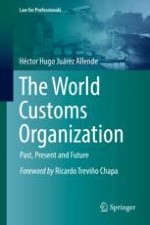
2022 | OriginalPaper | Buchkapitel
1. Introduction
verfasst von : Héctor Hugo Juárez Allende
Erschienen in: The World Customs Organization
Aktivieren Sie unsere intelligente Suche, um passende Fachinhalte oder Patente zu finden.
Wählen Sie Textabschnitte aus um mit Künstlicher Intelligenz passenden Patente zu finden. powered by
Markieren Sie Textabschnitte, um KI-gestützt weitere passende Inhalte zu finden. powered by